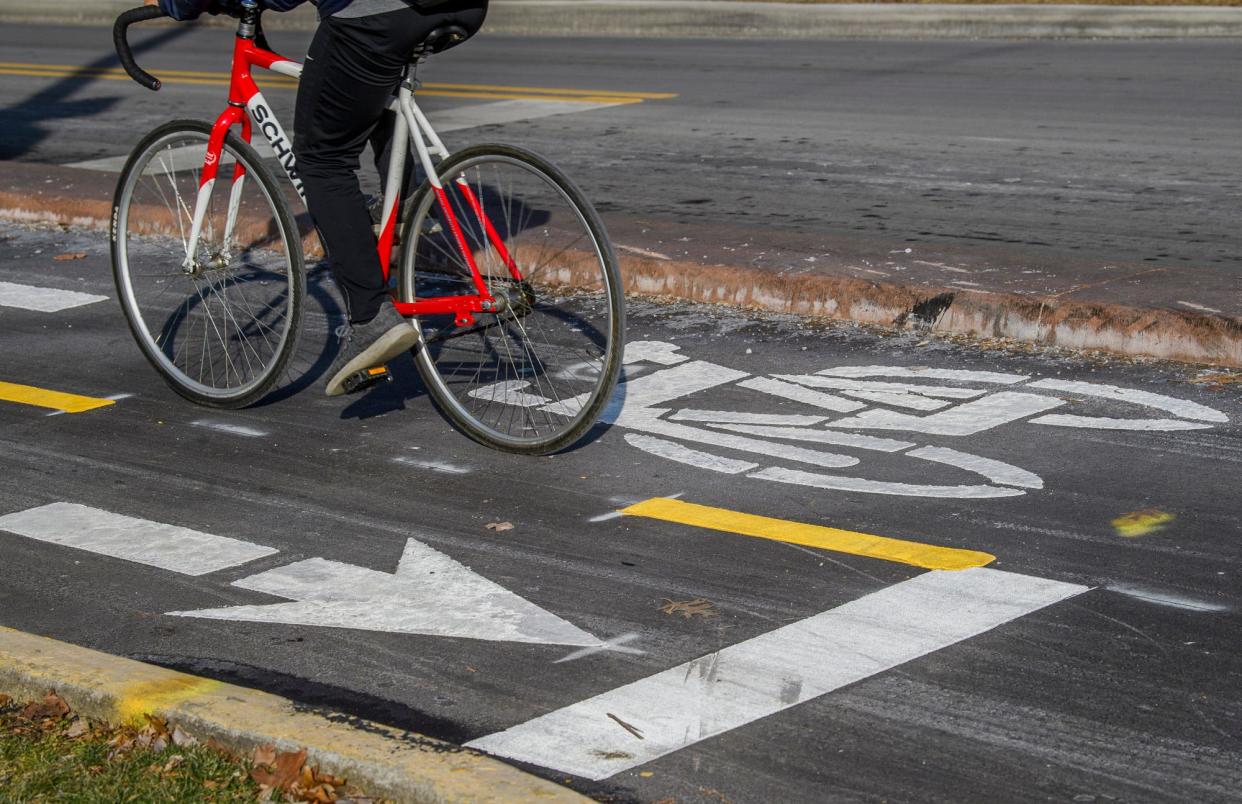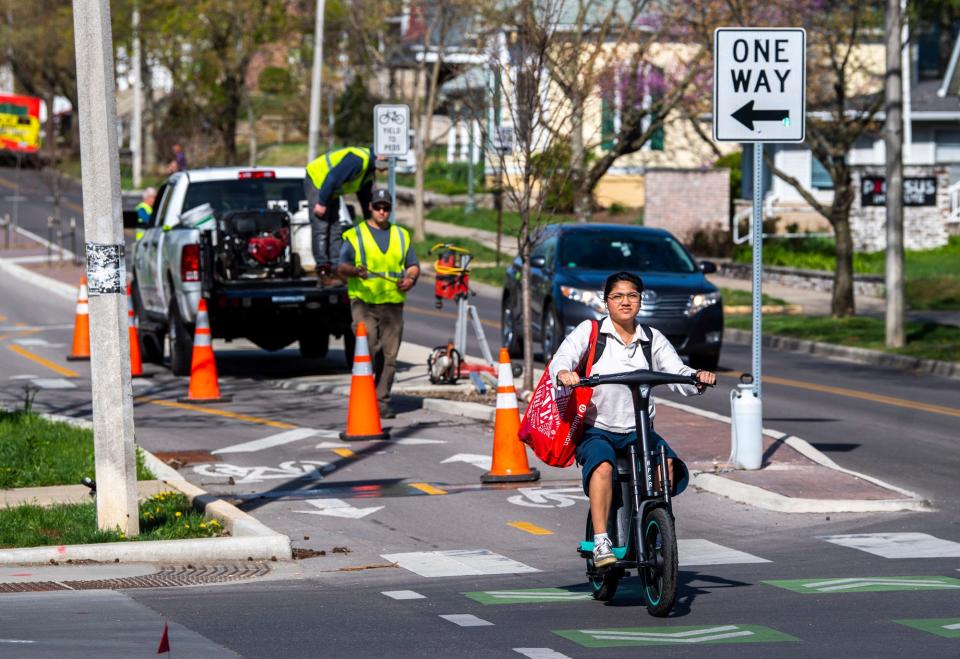Bloomington mayor vetoes city council decision on 7-Line stop signs

Bloomington Mayor John Hamilton has pulled the brakes on the city council's controversial plan to reinstall additional stop signs along the 7-Line bike lane.
The mayor said in a news release late Friday afternoon that he has vetoed the council's decision to reinstall stop signs on Seventh Street where it intersects with Lincoln, Morton and Washington streets.
Hamilton said he vetoed the council’s plan in the interest of safety, to reduce confusion and because the council’s 11th-hour move deprived local residents and commissions from providing input.
Two council members who voted for the reinstallation of the stop signs on Oct. 4 said they were disappointed by the mayor’s veto. A council member who voted against the reinstallation said the mayor’s move was good news.
The city completed the two-way protected bike path on the south side of Seventh Street in 2021 to connect the B-Line Trail, downtown, Indiana University campus and eastside neighborhoods. The project included the removal of stop signs along the corridor to ease traffic flow. Before the 7-Line project, drivers and cyclists going east or west on Seventh Street and going north or south on cross streets had to stop at stop signs. The 7-Line project removed stop signs for east/west traffic.
More crashes on Bloomington 7-line prompt backpedaling
An increase in accidents after project completion prompted Bloomington City Engineer Andrew Cibor this year to suggest the city reinstall stop signs at five cross streets along the route — Dunn, Washington, Lincoln, Grant and Morton.
However, the local traffic and bicycle and pedestrian safety commissions both opposed Cibor’s plan — except for Dunn Street — in part because, members argued, it would impede cyclists' east-west progress even though the problem lies with inattentive north-south drivers and speeding or inattentive east-west drivers.
Cibor, saying the issues were complicated, acquiesced and issued a 180-day order to reinstall stop signs only at the intersection of Seventh and Dunn streets. As that order was to expire this month, he asked the council last week to make the installation permanent.
However, council member Dave Rollo introduced an amendment to Cibor’s plan on Oct. 4 to require the city also reinstall stop signs at the intersections of Lincoln, Morton and Washington streets. Rollo said he had heard, especially from older constituents, that they did not feel safe enough to cross Seventh Street.
Reinstallation opponents said the move would sharply decrease the route’s popularity among bicyclists, who would lose momentum on the city’s main east-west corridor. Council member Stephen Volan said the plan would “ruin” the 7-Line.
Volan’s camp also accused proponents of favoring drivers over cyclists, a charge that Rollo and his supporters rejected.
After an often contentious meeting that day, the council voted 5-4 to reinstall the stop signs at Dunn and the three other intersections.
'Bitterly' split: Bloomington council votes to add stop signs along 7-Line bike path
Hamilton said Friday he vetoed that decision in part because the reinstallation proponents’ primary rationale, pedestrian safety, belied available data.
“Since its re-opening, the Seventh Street corridor has seen an improvement in pedestrian safety with a decrease in pedestrian-involved crashes,” Hamilton said in the news release.
The mayor also said he didn’t like Rollo introducing his plan on the day of the Oct. 4 meeting.
Rollo’s plan “was proposed in a way that did not allow for any significant notice to or input from the public, including particularly the resident commissions charged with advising on any changes,” Hamilton said.
Those comments echoed sentiments shared on Oct. 4 by Pauly Tarricone, a member of the city’s bicycle and pedestrian safety commission, who said Rollo’s last-minute proposal showed he was not interested in seeking input from the population most directly affected by his proposal: students who were busy taking mid-term exams.
Hamilton: Stop-sign reinstallation on 7-Line might cause confusion
Finally, the mayor said, he worried the stop sign reinstallation might confuse traffic participants who just now appear to have adjusted to the new traffic patterns.
“Frequent changes along one corridor can cause great concern,” he said.
Volan in that Oct. 4 meeting had already predicted that the next city council — municipal elections are underway — would undo Rollo’s “bad policy.”
Cast your ballot: What to know about early voting in Monroe County, Indiana
Four of the five council members who voted for Rollo’s plan won’t be on the council come January. Three of the four who opposed his plan will remain. One likely new member, Hopi Stosberg, said she opposed Rollo’s plan.
Rollo said Friday it’s far too early to speculate how the next council would vote on the matter.
He called Hamilton’s veto “pretty heavy-handed” and “disappointing.”
Rollo said he understands the desire for bicyclists to be unobstructed — he served on the Bloomington Platinum Biking Task Force — but also said pedestrians are “undervalued relative to … cars and bikes.”
He said many people, including a local judge, told him that additional stop signs would improve pedestrians’ comfort level in crossing Seventh Street.
“I hope there aren’t any injuries there going forward,” Rollo said.
He said he could try to override the mayor's veto, but that would require six votes, which he doesn't have.
Volan said Friday Rollo’s plan was reactionary, his concerns overblown, and Hamilton’s veto was “good news.”
“I think the 7-Line is a fantastic amenity,” he said. “I’m happy to hear that (the stop signs) won’t be put back in.”

Cibor, the city engineer, has reissued the 180-day order for the Dunn Street intersection, meaning the stop signs there will remain. The end of that period will be in 2024, when the new council — and new mayor — can revisit the matter.
Susan Sandberg, who voted in favor of Rollo’s plan, said while she ran for mayor, she did not hear much support for the way the traffic patterns had changed on Seventh Street. She urged more Bloomington residents to come to public meetings to make their opinions heard, rather than criticizing government plans and actions just among themselves.
“The public has got to be more vocal about these things,” she said.
Boris Ladwig can be reached at bladwig@heraldt.com.
This article originally appeared on The Herald-Times: Bloomington mayor pulls brakes on city council's stop sign plan

